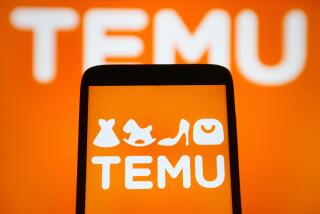Couriers in Combat
GUANGZHOU, China — Driver Li Jing Chun, a wiry 28-year-old with a passion for jazz, has listened religiously to “Goat City Radio Station, FM 105.2” since joining air express giant DHL earlier this year.
Far from easy listening, this is on-air chaos, providing regular updates on the latest automobile pileup, sewer backup or errant farm animals plaguing drivers in this southern China industrial capital long known in the West as Canton.
Dawn-to-dusk traffic gridlock, nonexistent maps, and streets that turn into rivers during the rainy season are just some of the problems facing the world’s courier companies as they turn their sights on this booming express cargo market.
“The logistical uncertainties of operating [in China] on a day-to-day basis are very, very high,” said Denis Simon, head of the China practice at Chicago-based Andersen Consulting.
In spite of these daunting obstacles, DHL Worldwide Express, Federal Express, United Parcel Service and Australia-based TNT are pumping more than $1 billion into Asia, taking particular aim at China, one of the world’s fastest-growing cargo markets.
Guangzhou--said to have been founded by five celestial beings riding on goats, thus the nickname Goat City--is the capital of Guangdong Province, whose proximity to Hong Kong and Taiwan has made it a magnet for international investment and trade.
“The Guangzhou market is one of the most competitive markets in the world,” said Benjamin Choi, director of sales and marketing in China for UPS, which lags far behind its major competitors in Asia but has enjoyed a 120% increase in business here in the last 12 months.
*
For decades, foreign air cargo carriers have gazed longingly across the Pacific at China’s market. As China’s economic and political doors cracked open, the demand for express cargo services has grown rapidly, driven largely by foreign-based companies needing documents, spare parts and sample products shipped quickly to other parts of their global networks.
In addition to the enormous potential represented by China’s billion-person-strong market, the air express industry saw opportunity stemming from the woefully inadequate ground transport system here, including a national railroad that uses at least nine different rail gauges.
China’s stodgy domestic express company, Express Mail Service, has posed little competition to these aggressive, technologically advanced and big-spending foreign carriers, who have carved away nearly half of its onetime monopoly.
DHL has grabbed the lead among the outsiders with control of an estimated 25% of the market. Federal Express has 15%, and the remaining 10% is divided among a small number of competitors, including UPS, according to Lee Hibbets, research director for Seattle-based Air Cargo Management Group.
But it’s proved even harder for couriers to make money in China than in other developing countries. In addition to its bad roads, China presents a Communist leadership eager to maintain tight control over foreign shippers, political uncertainty over shipments between the mainland and Taiwan, and border officials with a reputation for corrupt and fickle behavior.
Brussels-based DHL Worldwide Express, which plans to have 36 offices in China by the end of this year, vows to maintain its lead. The company is in the midst of a multimillion-dollar modernization campaign that includes a computer system for tracking packages in China, training programs and increased marketing, particularly among China’s newly rich.
“I do a lot of yacht racing, and the place I don’t like to be is out in front,” said Peter Tilby, DHL’s regional director of marketing for Asia. “You spend your whole time looking over your shoulder at the other guy.”
To prevent outsiders from gaining too much control over its lucrative service sector, China has steered foreign companies into joint ventures with powerful Chinese companies that act as gatekeepers, said Simon, of Andersen Consulting.
In the air express market, that has led to an unusual and awkward case of industrial polygamy. Sinotrans, China’s leading state-owned freight company, is partners not only with DHL but also with its major competitors, UPS, TNT and, until recently, Federal Express.
Being teamed up with Sinotrans has its advantages, since the company is the most politically connected and powerful Chinese shipping company.
But sharing the same partner, no matter how attractive or well-connected, isn’t easy. The joint billing makes it harder to create a distinct image in the minds of Chinese consumers. And it removes the competitive advantage that comes with being tied to the most important player in town.
Tilby acknowledged that this situation creates unusual management challenges, though he insists that Sinotrans has been “adept” at “keeping our operations distinctly separate.” He says he doesn’t worry that the strategic secrets he shares with his Sinotrans partners might be leaked to competitors.
Choi, who works out of UPS’ Beijing office, agrees.
“One learns to live with it,” he said. “Once you understand how the system works, it isn’t as complicated as it appears. The Chinese are very comfortable with this.”
*
Not everyone shares those feelings. Several years ago, Federal Express, reportedly unhappy with its partnership with Sinotrans, switched to EAS Transport, a new transport firm affiliated with the People’s Liberation Army.
Michael Ducker, a Federal Express executive based in Hong Kong, said EAS executives exhibited an “intense competitive spirit and great service attitude” that was “somewhat unique in China.”
Federal Express, which has operated in China since 1984, has spent hundreds of millions of dollars building its Asia network, including a hub at Subic Bay in the Philippines. FedEx, the only U.S. carrier with permission to fly directly into China, recently expanded its China flights to four times a week.
FedEx hopes to increase the profitability of its Asian operations by getting permission from Japan to fly directly from that country, the biggest cargo market in Asia, to China and other Asian destinations. But that issue is caught up in a bigger dispute between the U.S. and Japan over bilateral aviation rights.
FedEx competitors argue that they can provide faster, and equally reliable, service by buying space on commercial carriers flying into China’s largest cities or flying packages into Hong Kong and shipping them across the border by truck.
All the foreign express operators agree that Hong Kong’s role as a key management and transshipment center should be strengthened now that the former British colony is a part of China.
One huge question mark, however, is the future of the tumultuous relationship between the longtime political enemies in Beijing and Taipei, who recently allowed the first direct ocean shipments between the two regions.
Abolishing the decades-old ban on direct economic contacts between mainland China and Taiwan would dramatically affect the triangular flow of goods, money and people that has historically moved through Hong Kong.
But no one is sure when--or if--that will happen. DHL is beefing up its southern China operations, particularly in those port cities already benefiting from indirect trade and investment with Taiwan.
“Those of us in southern China are just waiting,” said Gian Sharp, DHL’s general manager for the south China region based in Guangzhou.
UPS embarked on a huge gamble when it developed a $400-million Asia hub in Taipei earlier this year. Greg Smith, vice president of Colography Group, a Marietta, Ga.-based cargo consulting firm, is convinced that the move, though risky, may prove to be extremely smart in the long run.
“All you need is for Taiwan to be annexed back to the mainland and UPS has domestic traffic rights within China,” he said. “It’s a long-term gamble, but to me it’s going to look brilliant.”
*
But many argue that UPS is in grave danger of getting caught in the cross-fire if relations sour between the two governments, each of which claims to be the rightful ruler of China. In the case of a military confrontation, air traffic might be disrupted or the Asian hub could become a target for attack.
“It’s not a bad choice, but if the [goal] is China, it is a big risk,” said consultant Simon.
Staying on good terms with the Chinese government is a priority for these foreign companies, since a surly customs officer can turn 48-hour delivery into a weeklong nightmare. In the early years of China’s open-door policy, its customs officers gained a reputation for being belligerent, unpredictable and corrupt.
This is particularly critical for those companies that guarantee quick delivery of packages between the United States and mainland China. The basic cost of sending a two-pound package from Los Angeles to Guangzhou--which can take three to seven days--is $42 for Federal Express, $52.50 for UPS and $123.60 for DHL.
Although the Chinese government has launched a campaign in recent years to reduce corruption and unnecessary red tape at the borders, there are still frequent reports of shipments being unexpectedly held up or exorbitant tariffs charged for unexplained reasons.
In Guangzhou, DHL has brought the Chinese customs officers into the corporate family. At its processing center near the Guangzhou airport, DHL has installed a customs office and a bonded warehouse so its packages can be processed as soon as its trucks arrive from Hong Kong. But if the Chinese officials are unable to break away from their offices a few miles away, the DHL staff takes their work to them.
“We bend over backwards to keep them happy,” Sharp said.
In any developing market, the pressure to give discounts is keen. But DHL, which handles 20,000 parcels a month at its Guangzhou facility, has refused to play the price game here, counting on its customers to pay a premium for DHL’s global network and reliability.
Foreign companies and joint ventures are DHL’s best customers. Sharp boasts that many U.S. companies, such as Nike, Procter & Gamble and Reebok, use UPS or FedEx at home but DHL in China.
By exploiting weaknesses in the Chinese economy, such as the inadequate banking system, DHL has also created business that would not be found in a developed country.
In Shenzhen, the special economic zone near Hong Kong, there are corporate customers who use DHL to transport large checks to the United States for processing, saving them thousands of dollars in interest by getting the money to their banks a day earlier.
China’s nouveau riche are next on DHL’s list as potential customers. In an effort to boost its name familiarity on the mainland, DHL has begun marketing on billboards, television and other media, as well as sponsoring soccer games, car shows and karaoke competitions.
*
Since southern China is a magnet for job-seekers from all over China, DHL has had no problems finding eager young people to work in its 12 express centers and processing center in Guangzhou.
But promoting customer-friendly attitudes has been challenging, since China had for four decades operated under a you’ll-get-it-when-the-government-wants-you-to-get-it philosophy.
“We need people who have ‘Fuwu Yi Si’ [sense of service],” explained George Zhang, a DHL sales department manager.
DHL drivers average $3,800 a year in salary and housing allowance and can earn bonuses based on their performance. Once they’ve signed an employment contract, they are also eligible for medical insurance and a retirement fund.
But Li, a former taxi driver, said he didn’t join DHL for money. Far more important to him was landing a job in a company that uses modern technology and serves foreigners.
“I enjoy dealing with the different kinds of customers, and it also gives me a chance to improve my English skills,” he said.
Li, like many young Chinese, appears eager, even impatient, to find ways to hoist himself up an economic ladder that has taken millions of others from the fields to the city, from Mao suits to designer jeans, from a bicycle to a motorbike to a car.
“At DHL, the opportunities are great,” he said.
Min Lee of The Times’ Hong Kong bureau contributed to this report.
More to Read
Sign up for Essential California
The most important California stories and recommendations in your inbox every morning.
You may occasionally receive promotional content from the Los Angeles Times.










